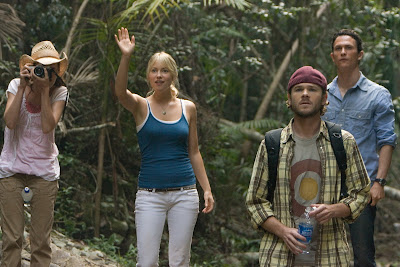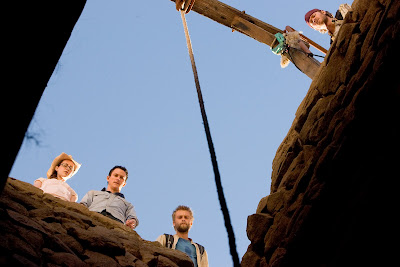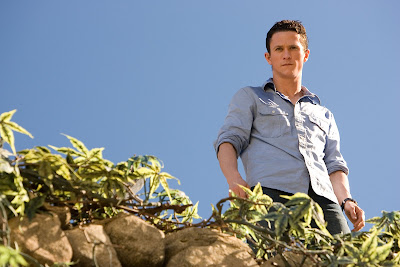
With
GEORGE WASHINGTON,
ALL THE REAL GIRLS, and
UNDERTOW, writer-director David Gordon Green has built a strong body of work that shows him to be a keen observer of human interaction and, along with cinematographer Tim Orr, a crafter of some of the decade's most beautiful films.
SNOW ANGELS, his fourth feature, is no exception. The film stars Sam Rockwell and Kate Beckinsale in a lyrical exploration of love and tragedy.
Green visited Columbus on March 28 to introduce
SNOW ANGELS for its local premiere at the
Wexner Center. (The film will begin a commercial run at the
Drexel Theatre on April 4.) I met with him to discuss
SNOW ANGELS, his methods and collaborators, and what the future holds for his career.
Mark Pfeiffer: SNOW ANGELS features your first adapted screenplay. How did that come about?David Gordon Green: It was a book that was brought to me by another director that was interested in having someone develop a project with him. So I started as a writer and was excited about the idea, the experience, the experiment of adapting a book. I started with page one and started writing it.
MP: How was it different working with material that you didn't generate first?DGG: One thing with anything that I write, I try to find characters that I emotionally relate to, and if they're not on the page, then I evolve them to be so. I personalized it, but the architecture was there. It was a really great book by Stewart O'Nan. I felt like the structure was in place so that it just was up to me to try to bring a little emotional authenticity and personal spin on it.
MP: The subject matter of the film is heavy, which is true of your other movies as well, yet there's a sense of hopefulness and optimism in spite of the tragedies. Is it fair to say you see the world in that way?DGG: Yeah, that's definitely how I am from my personal perspective on life. That's how I deal with rougher situations, but I think in this particular movie it was an experiment in emotion and having a shared experience by people going to a theater, seeing it together, witnessing it with people they know and people that are stranger, and, at arm's length, being able to digest the cautionary tale. At the same time it's being shown through the perspective of a young, hopeful high school relationship of two people that are going through the invitation and imperfections of their own connection.
MP: Sense of place is something you do really well in your movies. What I really admired about SNOW ANGELS is that it seemed to understand what life is like in a small town, the people that are there, the connections that are made, and even how the homes look inside and out. Are these places familiar to you from your background, or is this something that you've picked up along the way?DGG: Both. I've spent a lot of time of my life in small towns and find a real genuine sincerity to my affection for those cultures. There's a beauty in places that people don't see the obvious beauty, and it's not in the sterilized, Hollywoodized version of it. It's in the rust and the cracks and the shadows and the areas that people aren't always looking that I find the beauty in small towns and rural existence.
With this movie I wanted it to be universally appealing. Everything from the casting to the art direction to the selection of locations, I wanted to make sure that it was vague enough where everyone could relate to it. It could be anywhere, and it could be down the street. It could be you and me. By being in a cold environment it kept people indoors. A lot of this movie for me was about opening up the doors and seeing what the secrets were behind them.
MP: Is there anything you learned making this movie that you didn't on the others?DGG: I learn things every day. I try not to set up a situation during production that is so preconceived and planned and designed that it's not open to the evolution of a project, and once you have a great sense of artistic and technical collaborators, you just let it loose. So I learned a lot about working with actors.
It was the first film that I'd worked in that wasn't crewed by all of my friends. I brought all my department heads, and we went up to Nova Scotia. There was us and there was them. It was trying to communicate with them so they could become us and we could all work together and form that kind of unity that a true collaboration advances from. It was an experience in communication and working with bigger name actors that are experienced professionals. They demand discipline, trust, and energy from directors and all of us. We just brought our best plan and most open minds to the table every day.
MP: You've worked really well with kids in your movies. Obviously GEORGE WASHINGTON comes to mind, but even the little girl in SNOW ANGELS come across unlike the typical child performance. If anything, it feels like it documented how she is on the set that day. What's your method working with kids to get that out of them?DGG: My method working with kids is exactly what you said, documenting the kids as they are that day, not telling them what to say. Grace Hudson was three-years-old, and that's a really fun age to work with kids for me because they're not self-conscious. A lot of times you'll work with actors that have some degree of experience. They're seven-years-old and can smile at the camera and mug for you and be cute as a button, but that's not as interesting to me as some kid that's not trained and comes from a good, supportive place of family where you can trust emotionally they're not going to be damaged by the experience. I'm not going to lie. It can be a pretty challenging thing to go through emotionally.
As far as lines and working with her, there was one line where I needed her to say, "I want to go play outside." That was essential to the plot of the movie, and I needed her to say that, but I just gave her a Skittle and said, "Say this twenty times." (laughs) It was pretty easy. But then there would be situations when the little girl has to cry. The camera was there, she was crying, and we worked it into the scene. We filmed it and it plays to the emotional authenticity of what was going on in the scene, but it wasn't something that we had the agenda of filming.
MP: Do you use a lot of non-professional actors in the smaller roles? I get a sense that the people seem more authentic, that you're not necessarily having actors dealing with other trained actors on a lot of occasions.
DGG: I love two kinds of actors. Well, three kinds. I love all of them. What am I going to say? I love non-actors that are just charismatic, confident, crazy, or whatever they bring to the table, they're just characters. I love who they are, and I want to film it and have them say what they're going to say. I also love the extraordinarily talented, gifted, trained performers like Sam and Kate and Griffin Dunne and Jeanetta Arnette and the actors in the movie that brought more resume to the table. I love putting the extremes of those two together.
I was talking a little earlier about making it feel universal. In the casting too, I wanted to cast every one of the little bit parts with an ethnicity. So we've got a Croatian Chinese restaurant owner, we've got a Russian photographer, we've got an Australian carpet store owner. I really tried to find people within the local community of where we were filming in Halifax that weren't from there that brought an accent. It's another good way to dodge a Canadian accent when you're trying to make an American movie in our northern friends' country. There's a lot of effort in that. I love the idea of just having people be who they are and not telling them what to say but giving them a guideline of what the scene's about. If you set up the right environment, it can be really believable.
MP: It's interesting you say that because one of the things I think that you do well as far as, I don't know if you'd even say it so much as dialogue, but characters in your movies seem to have a lot of trouble articulating what it is inside them. I think it's really difficult from a filmmaker's perspective to be able to write that and to get that out of actors because otherwise it would seem rather unformed or lazy if you just say to them, "Well, go in front of the camera and not express yourself."DGG: Right.
MP: But in your films it seems much more refined to where I think of ALL THE REAL GIRLS where you've got these two people who are falling in love but also really don't know how to communicate. Of course, that's all over SNOW ANGELS as well. In the case of Rockwell's character, it's how he is saying one thing and he's putting on this mask of having redeemed himself and become a new man, but you can see the desperation leaking out. That's not something that really comes through in the words so much. I guess the question with that is how do you write that? How do you get that out of the actors because it's not something really that you can put on the page? DGG: It's not. It's weird because for me the perfect is the imperfect and that's what we go for. Sometimes that's the first take when they don't know what they're going to say, and you have those awkward pauses and imperfections of speech. Sometimes it's more rehearsed. So, depending on who the character is and what the specific instance of it is, it's always different, but in the editing room I find myself so drawn to those moments of vulnerability and awkward silence and two actors that are genuinely listening. You can see such a wonderful rhythm that feels believable. If I'm in a situation, especially of any drama or intensity, the last thing I am is eloquent. You see a lot of really amazing Oscar-nominated performers that go in there and always look cool and know the right thing to say, but how often do we really, especially when there's tension and emotion at stake? So I try to capture how would it really be.
MP: How much is improvised? How much do you stick to the script, and how much do you let them do on the set?DGG: I don't know percentage-wise. I haven't read the script since before we shot it if that gives you any sort of indication of my possessiveness of a script. I can just say a substantial amount of it is improvised. A lot of it is taken from the book. The actors had copies of the book and would take things from that.
But there would also be something like a scene when a detective comes up to Sam Rockwell when he's beginning his investigation. It's kind of a confrontational scene. It was cool. The detective was in a trench coat as he stereotypically would be, and we're kind of playing to the clichés. When we rehearsed it, I said, "It's missing something." While we were talking about what it might be, the actor dropped his pen that he was taking notes with. I said, "That's what you do. You come in there, and you have a confrontational scene, an aggressive scene. You approach. You drop your pen, and you have to pick it up. And that takes all the tension out of it. And then we're going to zoom into it as if that dropping the pen is the most important thing of this whole movie. That becomes what it's about." The scene is now not about two guys confronting each other. It's about a guy walking into an intimidating situation and dropping his pen. That never would have happened if we weren't just bullshitting about what makes it interesting and there was that happy accident.
MP: You've worked with cinematographer Tim Orr and composer David Wingo since the beginning of your career. How did you all meet, and what keeps you continuing the collaboration with them?DGG: I met Wingo, who I happen to be conveniently wearing the shirt for his band
Ola Podrida, I met him in the third grade when I was seeing
THE KARATE KID and he was there too. We were the only kids in the third grade that went to movies by ourselves, so we became friends. He works musically in a way that I work in movies, so it has always been a very quiet partnership where you read each others' minds, and that's been really awesome to have that. Then, depending on the project, we determine who his collaborator on the project might be. Sometimes it's bringing in electronic musicians, like in
SNOW ANGELS we brought Jeff McIlwain, who we met at freshman orientation at college. So the two of them collaborated on the score.
With Tim Orr and a lot of my crew on the movie, we went to film school together. We were assigned to work on a documentary project together, so he shot a documentary I did about the artificial insemination of cattle. Driving to and from set, which was an hour away, we were listening to music and talking and quickly realized that we liked each other and became friends. Then when I was looking at the dailies, I said, "Whoa, this is a DP I don't have to look over his shoulder and question the composition. I really trust his instincts in lighting. When he says we should shoot over here, he's right." So, he's a guy who literally, in a good way, I don't have to worry about the camera department. I just let him do his thing, and it always falls into line with my taste. There's a communication and a discussion sometimes, but in a bad way, I've lost all the vernacular and education and some of the insight I had to the camera department because he's so good that I don't study that. I just leave it up to him. It's been a great relief so I can work a hundred percent with the actors and the other elements of moviemaking.
MP: Is that your favorite part, working with the actors?DGG: My favorite part is actually casting a movie, which is working with actors and discovering who these characters could be. Everybody that you audition brings some new insight and love or repulsion of these characters. To me every moment is a discovery. Ultimately I guess that translates into working with actors. It's the most fun because you're in a room asking people to behave in ways that you want to see them behave, and how often in life can you play God like that?
MP: You've made smaller films up to this point. The action comedy PINEAPPLE EXPRESS is coming out this summer. Certainly in scale or release pattern it's a much bigger film for you. Do you see yourself continuing to do those sorts of movies, going back to the smaller ones, or alternating between the two?DGG: Literally I don't try to put that expectation on myself. By working with a group of people that I trust--department heads, friends that I've made, and actors--I look to them when I have an idea of what might be the next move. They really help me guide my own instincts and come up with what's unusual, what pushes me, what educates me, what's more of an adventure but also what maintains some degree of soul and intimacy that rings with a truth that says yeah, invest the next year of your life in this project, because you don't want to do that for nothing.
Something like
PINEAPPLE EXPRESS was a blast, it was a fun project that was made in a really wonderful way with an extraordinary, inspiring group of collaborators. And yet it can be a popcorn movie that people bring their friends to and have a great time at the movies. So I like to not put that expectation or that burden of what's next or where I come from or what makes sense and literally just follow my gut and bring the band.
MP: What haven't you done yet that you'd like to do?
DGG: A ton of things. The difficulty is that I have a lot of professional ambition, and to be healthy that has to be balanced with my personal life outside of movies. I get pretty excited. It's easy to get aggressive and take advantage of opportunities, but it's important to maintain and make sure you're walking your own beat and picking up stories that aren't just regurgitations of books or other people's screenplays, that they come from a real place. I'd love the opportunity of working in the genre of horror or making a western or science fiction movie. Right now I'm adapting a John Grishman book that's about a guy on death row, so I've been researching and hanging out in pretty interesting places and meeting some characters.
I'm interested in anything that is a path to other worlds. A lot of people use movies as escapism, as entertainment. I feel really fortunate to work in an industry that says, hey, go and invest, research, learn, occupy, and then entertain.
 STAR WARS: THE CLONE WARS (Dave Filoni, 2008)
STAR WARS: THE CLONE WARS (Dave Filoni, 2008) Set between ATTACK OF THE CLONES and REVENGE OF THE SITH, THE CLONE WARS follows Anakin Skywalker and his young protégé Ahsoka as they search for Jabba the Hutt's kidnapped son. Why bother looking for a baby slug during the middle of a war? Jabba controls key trade routes through which armies can be moved. Winning his favor could be a determining factor in the fight's outcome, but doing so is far trickier than the Jedi realize. The duplicitous Count Dooku has orchestrated blame for the abduction and rescue to fall on the Jedi, thus paving the way for his separatist forces and Jabba to sign a treaty regarding those important shipping lanes.
Set between ATTACK OF THE CLONES and REVENGE OF THE SITH, THE CLONE WARS follows Anakin Skywalker and his young protégé Ahsoka as they search for Jabba the Hutt's kidnapped son. Why bother looking for a baby slug during the middle of a war? Jabba controls key trade routes through which armies can be moved. Winning his favor could be a determining factor in the fight's outcome, but doing so is far trickier than the Jedi realize. The duplicitous Count Dooku has orchestrated blame for the abduction and rescue to fall on the Jedi, thus paving the way for his separatist forces and Jabba to sign a treaty regarding those important shipping lanes. Since the CGI-heavy prequels were practically cartoons anyway, the switch to full computer-animation for THE CLONE WARS should seem like a natural evolution for STAR WARS. The big miscalculation, though, is the plasticky design of flesh and blood characters. With faces like inexpressive rubber masks and immovable hair like that found on action figures, the characters have an unappealing look that puts them a few steps backwards technology-wise.
Since the CGI-heavy prequels were practically cartoons anyway, the switch to full computer-animation for THE CLONE WARS should seem like a natural evolution for STAR WARS. The big miscalculation, though, is the plasticky design of flesh and blood characters. With faces like inexpressive rubber masks and immovable hair like that found on action figures, the characters have an unappealing look that puts them a few steps backwards technology-wise.































